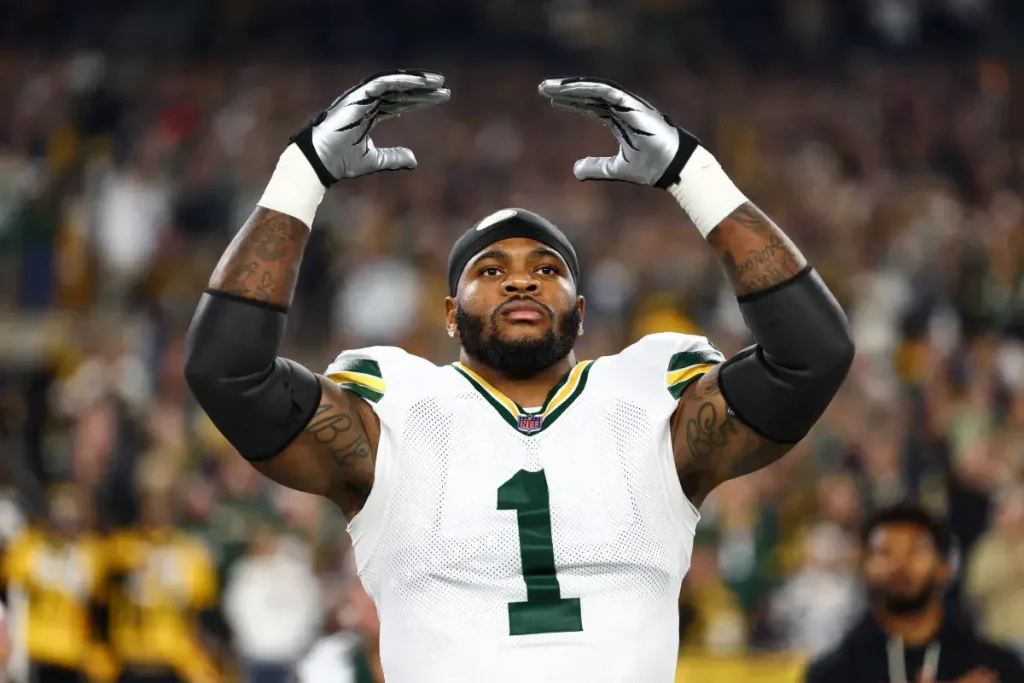Micah Parsons’ Heartfelt Tribute to Former Teammate Marshawn Kneeland
In an emotionally charged moment before the Green Bay Packers’ Monday Night Football game against the Philadelphia Eagles in Week 10, defensive end Micah Parsons paid a touching tribute to his former teammate Marshawn Kneeland. As Lambeau Field fell silent in remembrance of the 24-year-old former Dallas Cowboys player who died by suicide on November 6, Parsons knelt on the field in deep prayer, his head bowed and eyes closed. This poignant gesture highlighted the deep bond between the two defensive ends, despite their brief time together as teammates earlier this year. The moment served as a powerful reminder of the human connections that exist beyond the competitive nature of professional sports, revealing the profound impact Kneeland had made on those who knew him during his tragically short life and career.
When speaking to reporters about Kneeland’s passing, Parsons didn’t hide his raw emotions. “I was extremely shocked. I was extremely hurt by the news,” he shared, his voice conveying the genuine distress he felt upon learning about the tragedy. Parsons spoke thoughtfully about hoping his former teammate had found peace, while acknowledging the impossibility of truly understanding what Kneeland had been experiencing in his final moments. His reflections turned toward a broader message about life’s fragility and the importance of human connection: “We should all just use this time to stay prayed up… Life’s just so short, so we should really just start appreciating a little bit more and just loving people right and being purposeful with our intent and how we treat people and how we accept people.” These words resonated deeply, coming from a player known primarily for his fierce presence on the field rather than his philosophical outlook on life.
The relationship between Parsons and Kneeland, though relatively new, had clearly developed into one of mutual respect and professional admiration. Both men played the same position, creating a natural connection between them in the Cowboys’ locker room earlier in 2024 during Kneeland’s rookie season. “He always showed me nothing but respect from the moment he came into the locker room,” Parsons recalled with evident appreciation. “He respected me as a player; he respected me as a person. So, I have nothing but high respect for him.” This testimony speaks volumes about Kneeland’s character and how he carried himself as a young professional, making connections with established stars like Parsons despite being new to the league himself.
Parsons’ commitment to supporting Kneeland’s family demonstrates how the brotherhood of NFL players extends beyond team affiliations and active rosters. Though Parsons had moved from Dallas to Green Bay following an August trade that brought the Packers a significant investment (signing him to a four-year, $188 million extension), the bonds he formed with teammates like Kneeland remained intact. “If there’s anything his family needs, I’ll be the first person to help or offer anything I can do,” Parsons promised, showing that his concern transcends the business aspects of professional football. His pledge reflects the genuine care many players feel for their colleagues, recognizing that behind the helmets and jerseys are real people with families and loved ones who suffer immeasurably in times of tragedy.
The NFL itself acknowledged the gravity of Kneeland’s death by requesting that all teams participate in honoring his memory before their games that weekend. This league-wide response highlights how the loss of a young player affects the entire NFL community, not just his immediate teammates. For Parsons, now wearing the green and gold of the Packers instead of the Cowboys’ star, the moment of silence at Lambeau Field provided an opportunity to publicly demonstrate his ongoing connection to his former teammates and his respect for a life cut tragically short. His visible display of emotion during this tribute showed fans a side of professional athletes that often remains hidden beneath the competitive exterior they present during games.
Kneeland’s passing at just 24 years old serves as a stark reminder of the mental health challenges that can affect anyone, including professional athletes who may appear to be living dream lives from the outside. Through his heartfelt words and actions, Parsons helped humanize both himself and his former teammate, inviting deeper conversations about supporting one another and recognizing when someone might be struggling. As the Packers and Eagles prepared to compete fiercely on the field that Monday night, Parsons’ pregame moment of prayer for Kneeland reminded everyone watching that some things—friendship, compassion, and human connection—transcend the game itself. His message about appreciating life and treating others with purpose and acceptance resonates far beyond football, touching on universal truths that all of us, regardless of profession or circumstance, would do well to remember.


